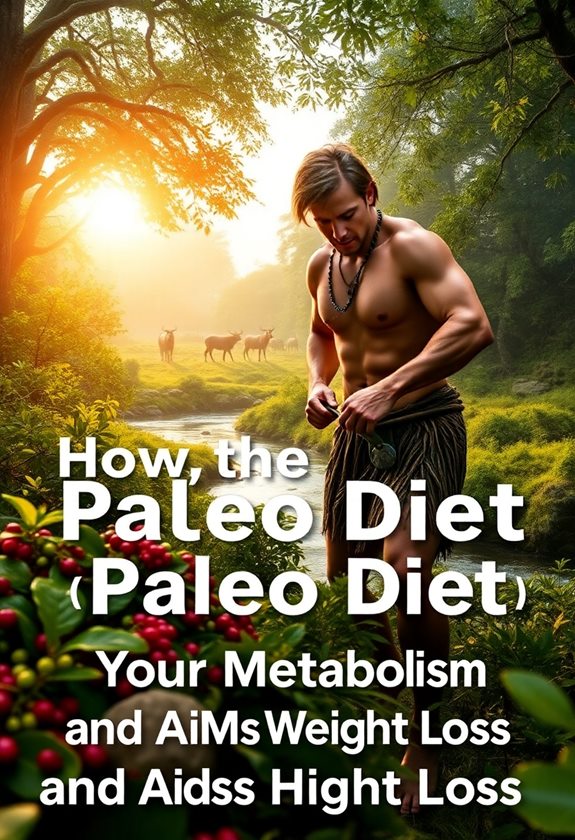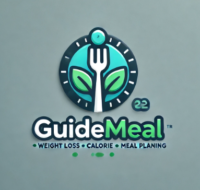The Paleo diet works because it's based on the foods our ancestors thrived on, like fruits, vegetables, nuts, and lean meats. Doesn't it make sense to eat what our bodies were made for? These whole foods give you essential nutrients and keep your energy steady. By avoiding processed foods, you cut out empty calories and help your digestion, too. Plus, this diet can boost your metabolism and help manage your weight! Think about how great it feels to have a hearty meal of veggies and lean meat! 🌿 If you're curious about how to make these ideas work for you, there's so much more to explore!
Key Takeaways
- The Paleo diet mimics ancient eating patterns, focusing on whole, unprocessed foods that align with our evolutionary biology.
- It emphasizes nutrient-dense foods, which provide essential vitamins and minerals for optimal health and energy.
- By eliminating grains and refined sugars, the Paleo diet supports weight management and prevents energy crashes.
- Whole foods in the Paleo diet promote gut health, reducing digestive issues and enhancing overall wellness.
- Modern adaptations of Paleo principles make it sustainable, allowing for flexibility while maintaining its core health benefits.
Evolutionary Perspective on Diet

Why do we often look to our ancestors when considering what to eat? It's simple: our diets have roots that stretch far back in time. Think about it—early humans thrived on foods that nature provided, like fruits, vegetables, nuts, and lean meats. They didn't have processed foods or fast meals. Instead, they hunted and gathered, relying on what was available. Doesn't that make you wonder what we might be missing today? Incorporating nutrient-dense foods like organic Hass avocados, which are rich in healthy fats and vitamins, can help us connect with those ancient dietary choices. These avocados are not only versatile but also provide nutritional benefits that contribute to overall health.
When you consider the evolutionary perspective on diet, you see how our bodies are designed for whole, natural foods. Our ancestors had strong bones and healthy hearts from eating what they found in the wild. By choosing similar foods today, you might feel more energetic and balanced. Isn't it interesting how our bodies still respond well to those ancient food choices?
Adopting a diet that mirrors our ancestors' can also help you connect with history in a fun way. You could try new recipes using wild game or foraged plants! So, why not explore some of those caveman-inspired meals? You might discover just how satisfying and nourishing they can be.
Nutritional Benefits of Whole Foods
When you choose whole foods over processed options, you're making a powerful decision for your health. Whole foods are those that are close to their natural state, like fruits, vegetables, nuts, and lean meats. They're packed with vitamins, minerals, and fiber that your body craves, making them an essential part of any balanced diet, including the Mediterranean diet, which emphasizes nutrient-rich ingredients for ideal health and well-being. Doesn't that sound better than a bag of chips full of empty calories?
Imagine biting into a fresh apple. It's juicy, sweet, and full of nutrients. On the other hand, a processed snack might taste good, but it often lacks the vitamins your body needs. Whole foods help you feel full longer, which can make it easier to stick to healthier eating habits, as seen in the structure of meal plans found in Mediterranean Diet Cookbooks.
Have you ever felt tired after eating junk food? That's because processed foods can lead to energy crashes. With whole foods, you get steady energy that helps you power through your day. Plus, they're usually lower in unhealthy fats and sugars, which is a win for your overall health.
Impact on Metabolism and Weight

Studies show that adopting a paleo diet can greatly boost your metabolism and support weight management. But how does it work? When you focus on whole foods like lean meats, vegetables, and fruits, you're fueling your body with high-quality nutrients. This helps your body burn calories more efficiently. Additionally, incorporating a balanced diet rich in vitamins and minerals, as emphasized in meal planning strategies, can further enhance your metabolic processes.
Have you ever noticed how you feel energized after a good meal? That's your metabolism kicking into gear! Unlike processed foods, which can slow you down, paleo foods keep your energy levels steady, helping you maintain a healthy weight.
In fact, many people find they naturally eat fewer calories on this diet because whole foods are more satisfying. Think about it: a hearty piece of grilled chicken with veggies fills you up more than a sugary snack.
Also, by eliminating grains and refined sugars, you're cutting out ingredients that can lead to weight gain. When your body isn't busy processing these additives, it's easier to shed those extra pounds.
Gut Health and Digestion
Over time, the gut has become recognized as an essential component of overall health, and the paleo diet plays a significant role in optimizing gut health and digestion. Have you ever thought about how what you eat affects your gut? The paleo diet focuses on whole, unprocessed foods like vegetables, fruits, nuts, seeds, and lean meats. This means you're fueling your body with nutrients it craves!
By cutting out processed foods, grains, and dairy, you reduce potential irritants that can upset your digestive system. Instead, you're giving your gut beneficial fiber from fruits and veggies. This fiber helps keep things moving smoothly and supports a healthy balance of gut bacteria.
Have you noticed how certain foods make you feel? When you eat clean, you might feel lighter and more energized. Many people report less bloating and discomfort when they embrace the paleo lifestyle.
Modern Adaptations of Paleo Principles

Many people today are adapting paleo principles to fit their modern lifestyles, making the diet more accessible and sustainable. You might wonder, how can you enjoy the benefits of the paleo diet without feeling restricted? The key is flexibility.
Instead of strictly avoiding all modern foods, consider incorporating whole, unprocessed options that fit your taste. For example, you can swap out traditional pasta for zoodles (zucchini noodles) or use cauliflower rice instead of white rice. This way, you still get delicious meals without sacrificing your paleo goals.
Another great adaptation is meal prepping. By planning your meals ahead of time, you'll save money and keep yourself on track. Have you ever found yourself reaching for junk food when you're hungry? With a little prep, that won't happen anymore!
Don't forget about snacks! You can enjoy nuts, fruits, or even paleo-friendly energy bars. It's all about finding what works for you while still embracing the core paleo ideas.

